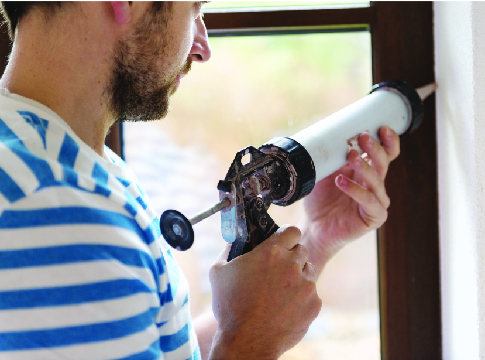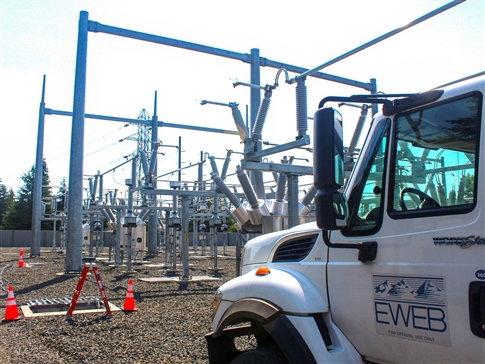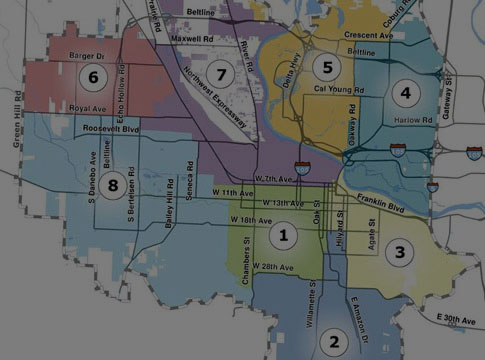Related News
Related News
-
EWEB Board of Commissioners selects BPA administrator for general manager role
In a unanimous vote, EWEB’s Board voted to move forward with negotiating an employment offer to BPA’s John Hairston.
Find Out More -
EWEB and Lane Electric Cooperative sign agreement to transfer EWEB's McKenzie Valley customers
EWEB and Lane Electric Cooperative have reached an important milestone in transitioning electric service from EWEB to Lane Electric in the McKenzie Valley. The two utilities have officially signed agreements for EWEB to sell its electric service territory in the McKenzie Valley to Lane Electric.
Find Out More -
EWEB Board adopts 2026 organizational goals to guide utility priorities
At the January public meeting, EWEB adopted a new set of organizational goals for 2026, providing direction for our work priorities in the year ahead.
Find Out More -
Cold temperatures this week drive highest electricity demand of the winter so far
Frosty conditions in Eugene this week have driven electricity demand to the highest levels so far this winter as heaters strain to keep homes and businesses warm.
Find Out More -
Our Favorite Photos of 2025
For a final look-back at 2025, we’d like to share some of our favorite photos that illustrate our work day-in and day-out. We celebrate amazing teamwork, vital partnerships, and sing the praises of our individual champions and their quiet dedication to serving our community!
Find Out More -
Sustainability Snapshot - Celebrating Energy Efficiency Projects in the Community
Sustainability Snapshops highlight impactful projects completed by EWEB's Customer Solutions department, as a way to celebrate the meaningful work happening behind the scenes.
Find Out More -
McKenzie Valley electric service territory realignment study reaches key milestone
EWEB Commissioners approved a resolution authorizing the General Manager to negotiate and execute agreements with Lane Electric Cooperative regarding a potential realignment of electric service territory in the McKenzie Valley at the Board’s December meeting.
Find Out More -
EWEB Sets 2026 Budget and Rates, Advances Evaluation of McKenzie Valley Service Territory Realignment
Taken together, the 2026 budget and rate adjustments and the territory-realignment evaluation reflect EWEB’s dedication to responsible financial stewardship, modern, resilient utility infrastructure, and thoughtful planning for the future.
Find Out More -
Let's Talk Turkey. Is your family ready for winter?
We're heading into the holidays, but that also means snow, ice, and not-so-nice weather might be in the forecast. Here are some tips to prepare in advance.
Find Out More -
Vote for your favorite Public Power Week Posters
The top five submittals will receive awards. Help us pick the winners.
Find Out More -
EWEB general manager to retire in 2026
EWEB launches nationwide search for next leader to continue the progress of the last decade and ensure a smooth transition.
Find Out More -
The Bonneville Power Administration Rate Change and Your EWEB Bill
BPA’s finalized rate increase is smaller than projected, and EWEB’s pass-through adjustment effective October 1, 2025 will now be 2.7% for residential customers—down from the anticipated 4%.
Find Out More -
Join the Pledge to Prepare
When you think about getting ready for an emergency, you probably have questions. You aren't alone. Preparing for emergencies can be overwhelming, which is why EWEB has put together a 12-month program to help you and your family get two weeks ready.
Find Out More -
You can’t predict the next disaster, but you can prepare
The earthquake lasted less than a minute. But now the power’s out. The tap runs dry. Cell service is spotty. Would you be ready?
Find Out More -
Oregon’s New Utility Laws and How EWEB Customers Already Benefit from Fair, Transparent Rates
Oregon’s POWER Act and FAIR Energy Act target investor-owned utilities. Learn how EWEB’s local, community-owned model already meets these goals.
Find Out More - Show More
As prices increase, what can you do to take control of monthly utility bills?
October 06, 2023 • Jen Connors, EWEB Communications

As a customer-owned utility, EWEB does not earn a profit. The prices you pay are based on the costs to serve our community with safe, reliable water and electricity.
We work hard to manage the expenses involved in delivering power and water, but those costs are going up and by all indications, will continue to do so. The costs to generate and purchase electricity are rising in response to nationwide grid modernization efforts. Aging infrastructure needs investment. And inflation is driving up the price of equipment such as pipes (up 50% in the past two years), transformers (up 50-85%), and power poles (up 30%).
As a result, EWEB’s Board of Commissioners is considering rate changes in 2024 to help maintain reliable utility services and fund critical investments in Eugene’s water and electric infrastructure, such as replacing aging water storage tanks, strengthening pipelines, and rebuilding substations.
You can find lots of information about major factors and trends driving projected 2024 price changes on our website. While understanding the reasons behind price increases is important, it doesn’t help if you are already struggling to make ends meet. So we want to focus on ways to save money and manage your bill, and how EWEB can help.
Get help upgrading your home to reduce energy & water usage
An important way that we help customers is through efficiency and conservation programs. You can take advantage of cash rebates and zero-interest loans to upgrade insulation, windows, heating systems, water heaters, and more, all of which create year-round bill savings. For example, a super-efficient heat pump water heater can reduce hot water costs by 50%.
Rebates are enhanced for limited-income customers, often covering the full cost to upgrade.
This table shows the current efficiency assistance programs available to EWEB customers.
| Product | Limited Income Rebate | Standard Rebate |
|---|---|---|
| Ductless Heat Pump | Owner Occupied: $4,500 Rental:$1,000 |
$800 |
| Insulation | 100% of eligible program costs | Up to 50% of eligible costs |
| Windows | Owner Occupied: $20/sq ft of glass Rental: $10/sq ft of glass |
$4/sq ft of glass |
| Heat Pump Water Heater | Owner Occupied: $1,700 Rental: $1,000 |
$800 |
| Toilets | $100 for 1.0 gallons-per-flush (gpf) toilets and $50 for 1.28 gallons-per-flush toilets | Same |
Check out energy-saving tips
The cheapest electron or gallon of water is the one you never use. There are lots of simple, low or no-cost steps to reduce your usage and make your home feel more comfortable. For example, use less hot water, keep your thermostat set at 68 or lower, and seal leaks and drafts. You can find more tips at eweb.org/SaveEnergy.
Apply for bill assistance
Our Customer Care program helps residential customers who face temporary and long-term financial difficulties. We offer an annual $280 bill credit for income-qualifying customers.
In addition to EWEB's Customer Care Program, you may also qualify for the federal LIHEAP program. LIHEAP provides financial assistance to limited income households for home heating and energy bills, and payments can be applied to electricity, gas, wood, pellets and propane. The LIHEAP program year begins the first working day of November. Funds are distributed on a monthly cycle until depleted. To learn more about LIHEAP, visit the Lane County website.
Ask about payment options
There may be options available if you fall behind on your utility bills. Please call Customer Service at 541-685-7000 or email eweb.answers@eweb.org to see if we can assist you. A customer service representative will review your account and determine if options are available.
Is your EWEB bill “affordable?”
The average EWEB residential customer in a single-family house pays about $6 per day to power their entire home and about $2 per day for water. Of course your actual bill may be lower or higher depending on usage, which is driven by the size of your home, number of people, quality of insulation, efficiency of heating system, etc.
Is $8 per day “affordable?” The answer varies from household to household. It’s not simply based on the cost per kilowatt hour or gallon of water charged by EWEB. Whether your EWEB bill is affordable depends in large part on your income.
Most Oregon government agencies consider a home “energy burdened” if 6% of your income is going to energy costs. If a household spends more than 10% of its income on energy, it is considered extremely energy burdened.
That’s why during the budget and rate setting process, one of the things we look at is percentage of income spent on utility bills.
As you can see from the graph below, the average Eugene household spends about 3.5% of income on energy and water bills combined. The graph also shows that while EWEB's rates are comparable with other communities in the region, the median household income in Eugene is comparatively low which means Eugene residents spend more of our income on water and electricity relative to surrounding communities.

How have your EWEB rates changed over time?
For several years we were able to delay projects and reduce expenses to avoid price increases. Over the last 10 years, electric prices have increased four times, and decreased or remained steady six times. Water prices also remained steady several times.

But the rising costs of power can't be absorbed and needed infrastructure investments can't be delayed indefinitely. Rate increases are needed to maintain reliable utility services and fund critical investments to keep the lights on and the water flowing.
Interested in learning more about how your rates are set are what you get for your money?
Because EWEB is customer-owned, utility rate-setting and other business is conducted in open public meetings. All of this information and more is available at eweb.org/RateInfo.
Related Programs
Reduce your energy and water waste. Our incentive programs can help with the upfront investment.
We're continuously working to provide you with safe, reliable services, maintain utility infrastructure, and invest in system improvements that make your services better.




